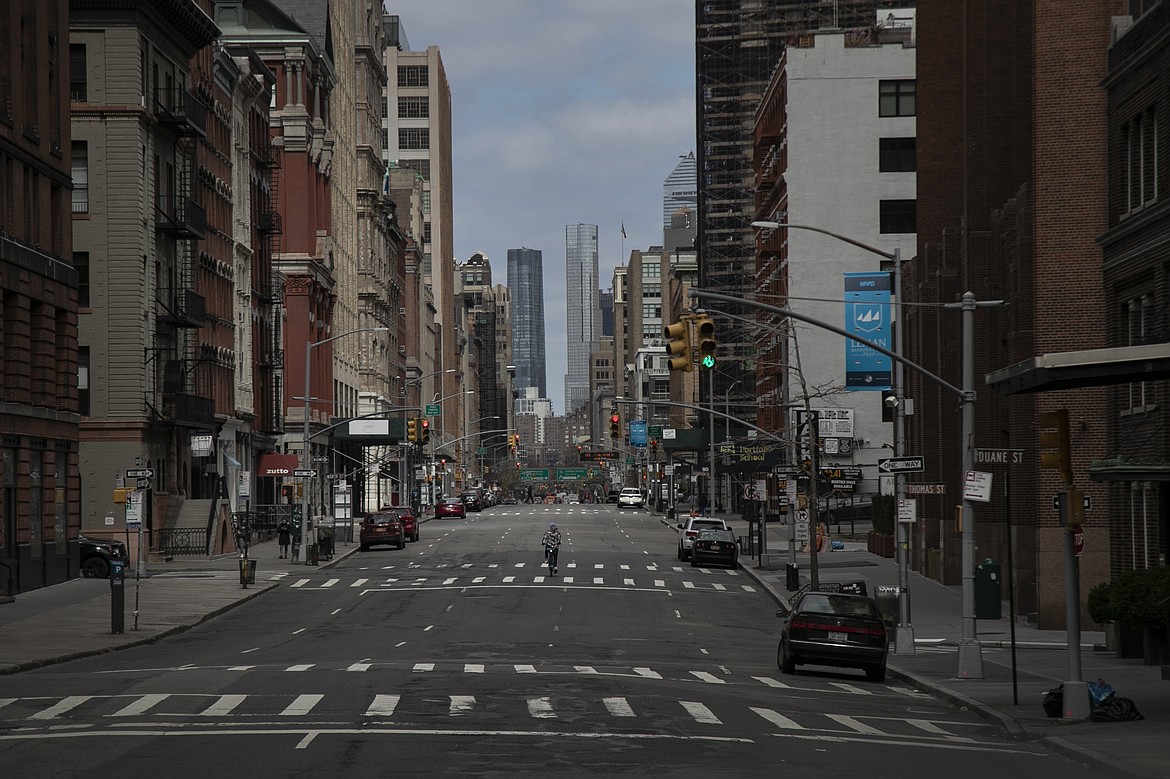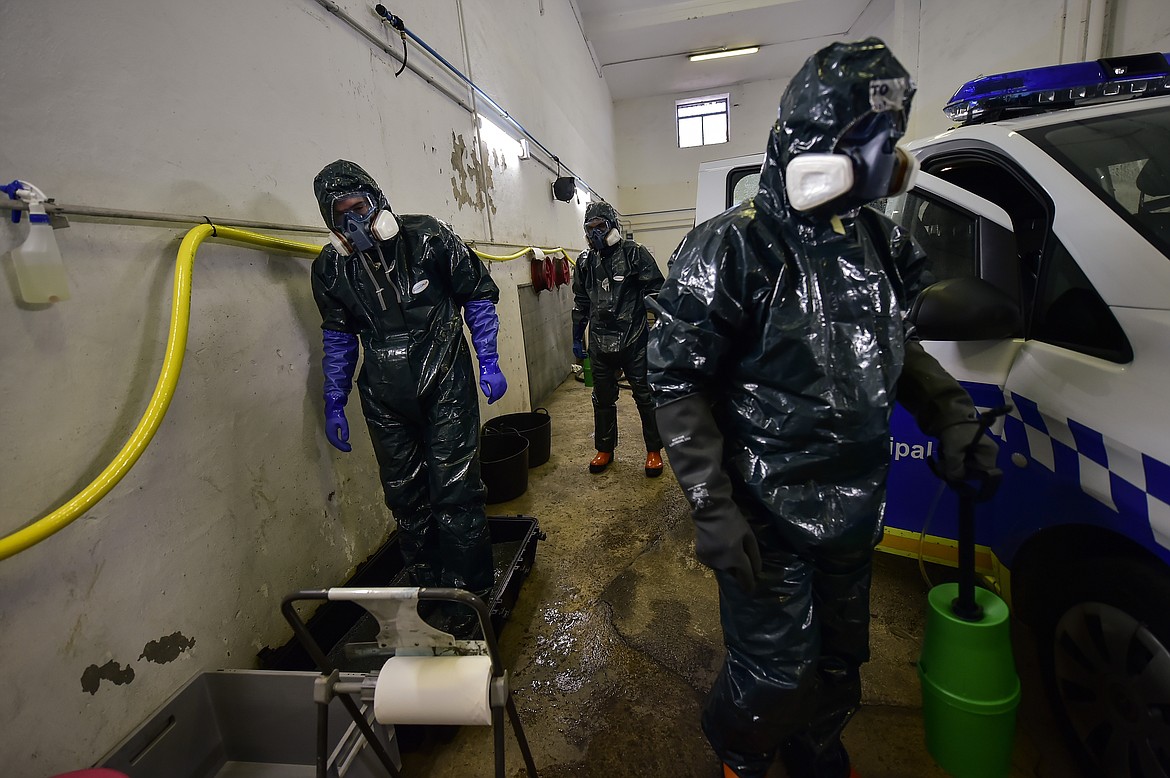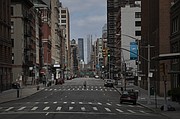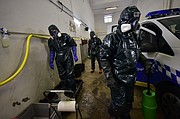New York quiets as it becomes next virus hot spot
By JIM MUSTIAN and JEFFREY COLLINS
Associated Press
NEW YORK (AP) — No more play dates, no more picnics in the park with friends, no more pickup games of basketball. No more commuting or using public transport — unless absolutely essential. New York is implementing dramatic restrictions Sunday in an attempt to slow a pandemic that has swept across the globe and threatened to make the state one of the world’s biggest coronavirus hot spots.
As case numbers soar — or in anticipation that they will — officials worldwide warned of a critical shortage of medical supplies. Spain was erecting a field hospital in a convention center, British health workers pleaded for more gear, saying they felt like “cannon fodder,” and President Donald Trump ordered mobile hospital centers be sent to Washington, California and New York.
New York Gov. Andrew Cuomo on Friday ordered all nonessential businesses in the state to close and nonessential workers to stay home, tightening even further restrictions put in place earlier in the week. The order takes effect at 8 p.m. Sunday, but officials were urging New Yorkers to start following it immediately.
Cuomo and New York City Mayor Bill de Blasio also called for getting everything from masks to gowns, as well as doctors and other medical workers to New York. De Blasio on Sunday asked Trump to have the U.S. military take over the logistics of making and distributing medical supplies. Cuomo warned that hard-hit states are outbidding one another for ever scarcer supplies, sometimes doubling or tripling prices.
“I can’t be blunt enough. If the president doesn’t act, people will die who could have lived otherwise,” de Blasio told NBC’s “Meet The Press.”
The top infectious disease expert in the U.S. promised New York City and the other hardest-hit places that critical supplies will not run out.
The medical supplies are about to start pouring in and will be “clearly directed to those hot spots that need it most,” Dr. Anthony Fauci, director of the National Institute of Allergy and Infectious Diseases, said on CBS’ “Face The Nation.”
Hours later, Trump said he had ordered the Federal Emergency Management Agency to ship mobile hospital centers to Washington, California and New York. For New York, that would mean another 1,000 hospital beds.
“No American is alone as long as we are united,” Trump said.
Meanwhile, the U.S. Senate turned back a potential $1.4 trillion aid package on a procedural vote. Democrats argued it was tilted toward corporations rather than workers and health care providers. But negotiations continued.
The delay shook investors, as futures for U.S. stocks fell sharply at the start of trading Sunday. Futures for the S&P 500 fell by 5%, triggering a halt in trading shortly after opening. Wall Street is coming off its worst week since 2008, with the Dow down 17%, many restaurants and bars nationwide closed and large swaths of the economy suddenly ground to a halt.
Worldwide, more than 330,000 people have been infected and nearly 14,400 have died, according to Johns Hopkins University. About 150 countries now have confirmed cases.
There were more than 33,000 cases across the U.S. and more than 400 deaths. New York state accounted for 117 deaths, mostly in New York City.
On Sunday, New York passed Washington state, the initial epicenter of the U.S. outbreak, in the number of fatal cases.
For most people, the new coronavirus causes only mild or moderate symptoms, such as fever or coughing. For some, especially older adults and people with existing health problems, it can cause more severe illness, including pneumonia. Some 93,800 people have recovered, mostly in China.
Cuomo has told hospitals to figure out ways to increase their current beds by at least 50% because predictions from health officials are that COVID-19 cases needing advanced medical care will top 100,000 in New York state in the next month or so. Such a deluge could overwhelm hospitals in a city that has about 53,000 beds.
Hospitals started to feel the crush Sunday, creating emergency room overflows and dedicating COVID-19 wings, with officials in Brooklyn saying a number were becoming overwhelmed.
Health care workers said they were being asked to reuse and ration disposable masks and gloves.
“The building is on fire,” said Dr. David J. Ores, describing the chaotic and ever-changing guidance medical professionals have been given. “It’s a mad scramble.”
But in the face of an invisible threat rather than billowing smoke or blowing snow, New Yorkers were still gathering in large groups in parks, playing basketball or having block parties. Similar scenes played out around the country.
Cuomo expressed exasperation Sunday that people were still ignoring orders to stay away from one another, saying he’s still seeing people acting like it was just another spring weekend.
“It’s insensitive. It’s arrogant. It’s self-destructive. It’s disrespectful to other people,” Cuomo said. “It has to stop and it has to stop now.”
Along with the staggering numbers, there were individual reminders Sunday of the reach of the virus. Republican Rand Paul of Kentucky became the first U.S. senator to announce he was infected. Opera superstar Plácido Domingo announced he has COVID-19, and German Chancellor Angela Merkel put herself into quarantine after a doctor who gave her a vaccine tested positive.
Elsewhere in the world, the coronavirus raged on. Italy and Iran reported soaring new death tolls.
Italian Premier Giuseppe Conte went on live TV to announce that he was tightening the country’s lockdown. Italy now has more than 59,000 cases and 5,476 deaths.
‘’We are facing the most serious crisis that the country has experienced since World War II,’’ Conte told Italians during a broadcast at midnight.
Iran’s supreme leader refused U.S. assistance Sunday to fight the virus, citing an unfounded conspiracy theory that the outbreak could be an American plot. Ayatollah Ali Khamenei’s comments came as Iran faces crushing U.S. sanctions over its nuclear actions. Iran says it has 1,685 deaths and 21,638 confirmed cases of the virus — a toll that experts from the World Health Organization say is almost certainly under-reported.
In many parts of the United States, officials were sounding the same not that New York leaders were: Stay away from large gatherings. Officials called them different things — social distancing, sheltering in place, or in the case of Nashville, Tennessee, a “safer at home” order.
“We’re all in quarantine now. Think about it,” Cuomo said.
Enforcement of any of these orders is still up in the air. Most locations simply broke up large gatherings and sent people home because one of the last things health officials wanted was putting people in confined spaces like jails. Many governments were even releasing nonviolent inmates.
Nearly 40 inmates had been diagnosed as of Saturday with COVID-19 in the New York prison system including the notorious Rikers Island complex and officials warned a huge jump in cases was likely coming.
The world kept shutting down, too. The long-haul airline Emirates — a major East-West carrier — said it will suspend all passenger flights beginning Wednesday over the outbreak. Singapore said it will fully shut its borders beginning Tuesday.
Sunday was Mother’s Day in Britain and the government had a stark message for millions: visiting your mother could kill her. Instead of parties, lunch or tea, Prime Minister Boris Johnson implored Britons to call Mom on a video chat.
Doctors in Britain made urgent pleas for more protective equipment as the number of coronavirus patients in U.K. hospitals soared to more than 5,000. Almost 4,000 medical workers signed a letter to the Sunday Times saying front-line staff felt like “cannon fodder.” They warned that medics would die if they did not receive better equipment.
In Spain, Europe’s hardest-hit country after Italy, intensive care units in some areas were close to their limits even before Sunday’s new tally of more than 28,500 infections and 1,750 deaths. A field hospital with 5,500 beds was going up in a convention center in Madrid and health officials warned more than 10% of the country’s health workers were now infected with coronavirus.
“We can’t just repeat the slogans that we will get through this together,” said Dr. German Peces-Barba, a lung specialist at Fundación Jiménez Díaz hospital in Madrid.
But there were some signs of hope. The Chinese city of Wuhan — where the global pandemic was first detected and the first city to be locked down — went a fourth consecutive day on Sunday without reporting any new or suspected cases.





